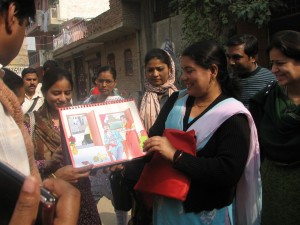The House GOP: Putting Women’s Needs Last
Jul 26th, 2013 | By admin | Category: Family PlanningBy Suzanne York, www.howmany.org
The U.S. House of Representatives Appropriations Committee recently introduced a bill that puts a ceiling on funding for family planning and reproductive health programs at $461 million; this is 23 percent, or $94 million below the current level (and $174 million less than President Obama’s budget request). The bill also calls to eliminate funding for the United Nations Population Fund (UNFPA), a long-time target of conservatives.
The bill also seeks to reinstate the global gag rule, which prohibits U.S. family planning funds from going to any organization which provides advice about legal health care options, including abortion, even using their own (non-U.S.) funds.
Amy Phillips Bursch of Population Connection put it well – “If you were unsure of the value “pro-life” politicians place on the lives of the poorest people in the world, you now have proof that it’s not much.”
Fortunately, the U.S. Senate has more politicians that seem to care about people. The next day after the House Appropriations Committee introduced its bill, the Senate Appropriations Committee decided to pass on that version of it and come of with its own improved one. Now the two committees must reconcile a bill and propose one agreed upon piece of legislation.
Why Support International Family Planning
First, it makes sense to support people’s rights around the world, especially for women. Increasing family planning funding will improve the health and well-being of women and their families. Giving women the tools and ability to be in charge of their lives will improve maternal mortality, lead to safer births and higher rates of child survival and result in healthier families.
Second, it’s a sound investment. Women know what’s best for themselves and their families, and empowered women want to empower their children. The U.S. Agency for International Development (USAID) believes that “a woman multiplies the impact of an investment made in her future by extending benefits to the world around her, creating a better life for her family and building a strong community.” Check out USAID’s infographic on why to invest in women.
U.S. Representative Nina Lowey (D-NY), in a statement on the House appropriations bill, noted that “It is unconscionable that anyone would insist on these cuts and policies riders knowing they will lead to 8,000 more maternal deaths, 40,000 additional orphans, and 1.4 million more abortions, compared to FY12 levels.”
And her colleague, Representative George Miller (D-CA), a strong supporter of family planning, said “The United States’ financial support for international family planning programs provides much needed health services that save the lives of women around the world. This critical financial support allows women in some of the world’s poorest countries access to vital family planning, pre-natal and maternal health care services that they would otherwise do without.”
This is About People, Not Politics
In the end, it is a cop-out to make this a political issue. With 222 million women in the developing world who want access to contraceptives but don’t have it, any funding that can help them out will go a long way. This is true especially of Sub-Saharan Africa, where most of the world’s population growth will take place in the coming decades.
And UNFPA’s record on family planning speaks for itself – from providing safe birthing kits to ending child marriage to meeting the reproductive health needs of refugees (just think of the one million Syrian refugees in the region and the health needs of women in refugee camps).
Supporting voluntary international family planning programs enable women in some of the world’s poorest countries access to vital family planning services, pre-natal care and maternal health care that they would otherwise do without. The U.S., and the world, cannot afford to let them go without these services.
Suzanne York is a senior writer with the Institute for Population Studies.
[photo credit: Suzanne York]

